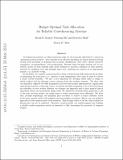| dc.contributor.author | Karger, David R. | |
| dc.contributor.author | Oh, Sewoong | |
| dc.contributor.author | Shah, Devavrat | |
| dc.date.accessioned | 2014-05-22T15:50:09Z | |
| dc.date.available | 2014-05-22T15:50:09Z | |
| dc.date.issued | 2014-02 | |
| dc.date.submitted | 2013-04 | |
| dc.identifier.issn | 0030-364X | |
| dc.identifier.issn | 1526-5463 | |
| dc.identifier.uri | http://hdl.handle.net/1721.1/87088 | |
| dc.description.abstract | Crowdsourcing systems, in which numerous tasks are electronically distributed to numerous “information pieceworkers,” have emerged as an effective paradigm for human-powered solving of large-scale problems in domains such as image classification, data entry, optical character recognition, recommendation, and proofreading. Because these low-paid workers can be unreliable, nearly all such systems must devise schemes to increase confidence in their answers, typically by assigning each task multiple times and combining the answers in an appropriate manner, e.g., majority voting.
In this paper, we consider a general model of such crowdsourcing tasks and pose the problem of minimizing the total price (i.e., number of task assignments) that must be paid to achieve a target overall reliability. We give a new algorithm for deciding which tasks to assign to which workers and for inferring correct answers from the workers' answers. We show that our algorithm, inspired by belief propagation and low-rank matrix approximation, significantly outperforms majority voting and, in fact, is optimal through comparison to an oracle that knows the reliability of every worker. Further, we compare our approach with a more general class of algorithms that can dynamically assign tasks. By adaptively deciding which questions to ask to the next set of arriving workers, one might hope to reduce uncertainty more efficiently. We show that, perhaps surprisingly, the minimum price necessary to achieve a target reliability scales in the same manner under both adaptive and nonadaptive scenarios. Hence, our nonadaptive approach is order optimal under both scenarios. This strongly relies on the fact that workers are fleeting and cannot be exploited. Therefore, architecturally, our results suggest that building a reliable worker-reputation system is essential to fully harnessing the potential of adaptive designs. | en_US |
| dc.description.sponsorship | National Science Foundation (U.S.) (Grant 1117381) | en_US |
| dc.description.sponsorship | National Science Foundation (U.S.) (EMT project) | en_US |
| dc.description.sponsorship | United States. Air Force Office of Scientific Research (Complex Networks project) | en_US |
| dc.description.sponsorship | United States. Army Research Office (Multidisciplinary University Research Initiative Award 58153-MA-MUR) | en_US |
| dc.language.iso | en_US | |
| dc.publisher | Institute for Operations Research and the Management Sciences (INFORMS) | en_US |
| dc.relation.isversionof | http://dx.doi.org/10.1287/opre.2013.1235 | en_US |
| dc.rights | Creative Commons Attribution-Noncommercial-Share Alike | en_US |
| dc.rights.uri | http://creativecommons.org/licenses/by-nc-sa/4.0/ | en_US |
| dc.source | arXiv | en_US |
| dc.title | Budget-Optimal Task Allocation for Reliable Crowdsourcing Systems | en_US |
| dc.type | Article | en_US |
| dc.identifier.citation | Karger, David R., Sewoong Oh, and Devavrat Shah. “Budget-Optimal Task Allocation for Reliable Crowdsourcing Systems.” Operations Research 62, no. 1 (February 2014): 1–24. | en_US |
| dc.contributor.department | Massachusetts Institute of Technology. Computer Science and Artificial Intelligence Laboratory | en_US |
| dc.contributor.department | Massachusetts Institute of Technology. Department of Electrical Engineering and Computer Science | en_US |
| dc.contributor.mitauthor | Karger, David R. | en_US |
| dc.contributor.mitauthor | Shah, Devavrat | en_US |
| dc.relation.journal | Operations Research | en_US |
| dc.eprint.version | Author's final manuscript | en_US |
| dc.type.uri | http://purl.org/eprint/type/JournalArticle | en_US |
| eprint.status | http://purl.org/eprint/status/PeerReviewed | en_US |
| dspace.orderedauthors | Karger, David R.; Oh, Sewoong; Shah, Devavrat | en_US |
| dc.identifier.orcid | https://orcid.org/0000-0003-0737-3259 | |
| dc.identifier.orcid | https://orcid.org/0000-0002-0024-5847 | |
| mit.license | OPEN_ACCESS_POLICY | en_US |
| mit.metadata.status | Complete | |
